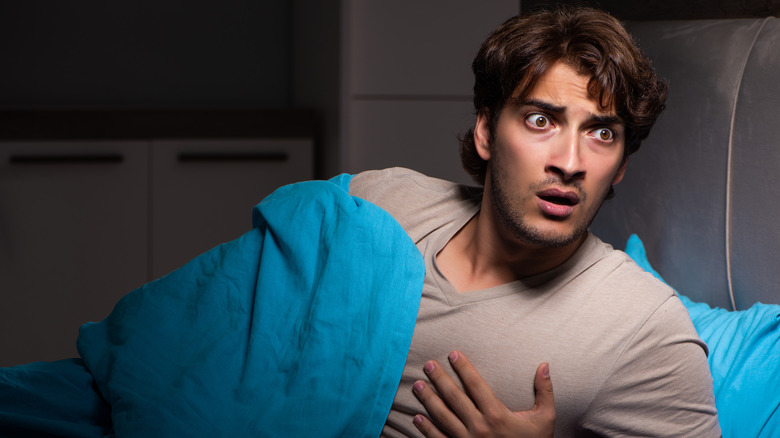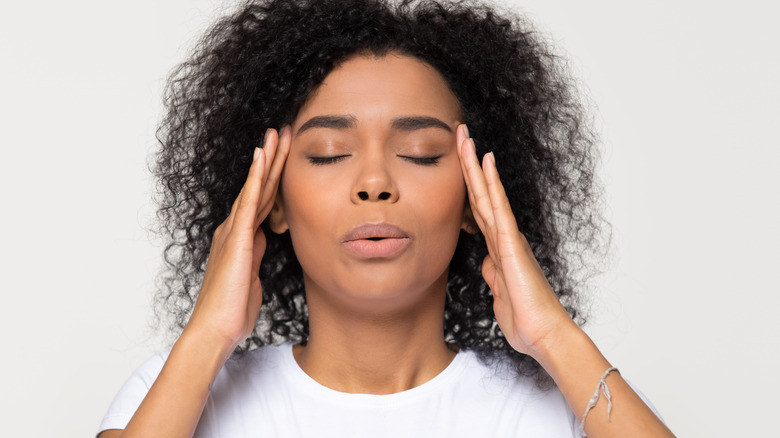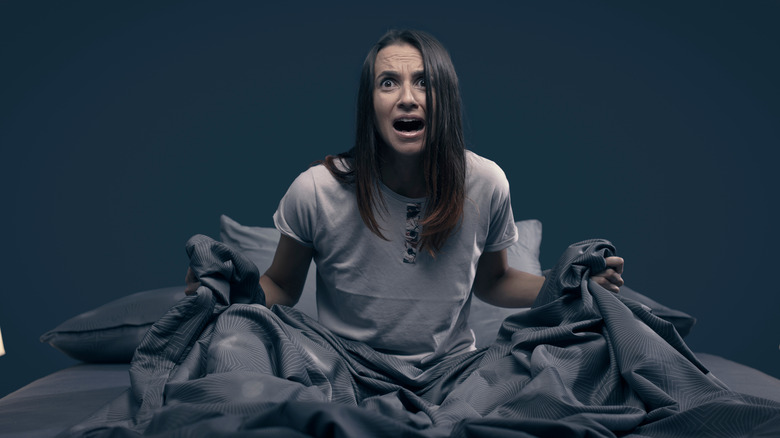Can You Have A Panic Attack In Your Sleep?
If you've had a personal experience with panic attacks, you'll know that they can be debilitating and disruptive to your daily life. Panic attacks, according to the Mayo Clinic, are sudden episodes of extreme fear that arise even when there is no evident threat or cause. According to the National Institute of Mental Health, panic attack symptoms can be so intense that they create disruption during daily activities. Individuals experiencing a panic attack may experience feelings of being out of control or a sense of impeding doom, along with a host of physical symptoms (via Mayo Clinic). According to WebMD, roughly one in every 10 people in America will experience an episode that is categorized as a panic attack. However, panic attacks are reported to be more common in women than in men. Additionally, people are more likely to experience panic attacks if they've been diagnosed with an anxiety disorder (via Medical News Today). Identifying a panic attack can be difficult, as some symptoms mimic conditions like a heart attack, and often relies on identifying the combination and frequency of the symptoms experienced by the individual (via WebMD).
Symptoms of a panic attack
Panic attacks typically come on very quickly. Unlike other types of anxiety symptoms, panic attacks can seem to bubble up almost instantaneously and without warning (via Mayo Clinic). They can occur while engaging in an activity such as working or driving your vehicle, or during periods of seeming relaxation, such as while watching television or socializing with friends. Physiological symptoms can include a rapid heartbeat, dizziness, shortness of breath, sweating, or a sensation of detachment or unreality. Individuals typically experience symptoms of a panic attack for around 10 minutes before they begin to fade, according to Medical News Today. But is it possible to have a panic attack when your body is at rest? The short answer is yes. They are called nocturnal panic attacks, and like their daytime counterparts, they may not have a clear trigger (via Shape). However, there is a suspected link between increased stress and nocturnal panic attacks.
Nocturnal panic attacks
While a waking panic attack can be scary to experience, having a panic attack in your sleep can be downright terrifying. Rest assured that while the experience of a nocturnal panic attack can be intense, they pose very little risk to your overall health, even if they aren't doing much for your beauty sleep (via Shape). Nocturnal panic attacks are simply panic attacks that happen at night; the symptoms of a nocturnal panic attack are the same as the symptoms of a panic attack that occurs during waking hours. Though there isn't a known or specific cause for nocturnal panic attacks, Medical News Today reports that there are a few identifiable risk factors. These include genetic predispositions to anxiety or panic disorders, a diagnosis of an underlying anxiety condition, experiencing panic attacks during the day, major life events or changes, and even certain personality traits.
The good news is that panic attacks, both nocturnal and waking, can be treated using a variety of techniques. Some simple lifestyle changes, such as reducing caffeine intake or using deep breathing techniques, can help to alleviate the stress that may trigger panic attacks (via WebMD). Other options like cognitive behavioral therapy or medications may be used to help reduce overall anxiety and decrease the risk for future panic attacks.



